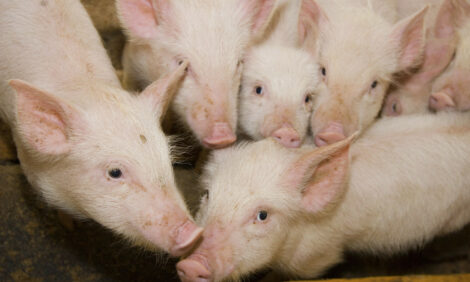



Weekly Overview: Looking Forward to the Future of the Pig Industry
GLOBAL - Cutting-edge technology to safeguard pig health was promised by the British Pig Executive (BPEX) at its Innovations Conference at the UK's National Agricultural Centre last week.The programme attracted very good attendance as Meryl Ward (chairman of BPEX) and Jane King (CEO of the Agricultural and Horticultural Development Board, AHDB) opened the meeting.
First topic on the programme was electronic identification in pigs using special ear tags. Charlie Purser of PureSpekt gave an overview of how the technology works, while Richard Riley of JSR and Katrina O'Kane of supermarket chain, Morrison's, confirmed their experience with the pilot tests, which demonstrated that the concept works.
Novel diagnostic methods for diseases from other sectors were explained by Neil Boonham of Fera Science and Professor Allison Wakeham of the University of Worcester. It emerged that some of the techniques used in the diagnosis of problems in cereals, trees and glasshouse crops could be applied also to pig diseases, allowing remote and/or earlier detection.
In a session on innovations in the supply chain, the audience learned about the application of LED lighting, control of odour and pathogens in public buildings and air ionisation, which helps to reduce dust levels. Applied to pig housing, all these technologies could contribute to better health and welfare of pigs as well as the people who look after them.
Using viruses to fight infections may sound like a risky option but the University of Leicester's Professor Martha Clokie explained about the concept of bacteriophages and how these viruses, which target specific bacteria, could be applied to pig production in the future by being used in the diagnosis and treatment of bacterial pathogens.
Last but not least at the BPEX Innovations Conference, Bent Anderson of ChemVet explored the use of probiotics and autogenous vaccines as means to prevent pig diseases. These products are already applied in the pig sector to some extent but he explained that they could help reduce antibiotic development by reducing the use of antimicrobials in the treatment of disease.
Just last week, the German Federal Cabinet has approved a new Antimicrobial Resistance Strategy (DART 2020).
With this newsletter, I say farewell to ThePigSite and its many readers around the world. It has been the greatest pleasure to serve and work with you over the last seven years and I send thanks and best wishes to you all as I move on to pastures new.








